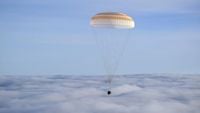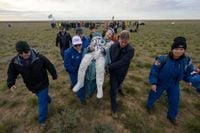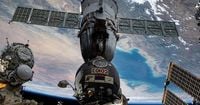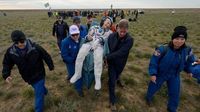NASA's oldest active-duty astronaut, Don Pettit, celebrated his 70th birthday in a rather unconventional way—by returning to Earth from the International Space Station (ISS) after a remarkable 220-day expedition. Pettit, along with Russian cosmonauts Alexey Ovchinin and Ivan Vagner, undocked from the ISS on April 19, 2025, at 5:57 p.m. EDT, marking the end of an incredible journey that spanned 3,520 orbits and 93.3 million miles.
The Soyuz MS-26 spacecraft, carrying the trio, landed safely on the steppe of Kazakhstan near the town of Dzhezkazgan at 9:20 p.m. EDT, which was 6:20 a.m. local time on Sunday, April 20, 2025—Pettit's birthday. As the capsule descended, NASA images captured the moment against a backdrop of the sunrise, a fitting scene for such a significant milestone.
Upon landing, Russian recovery crews and NASA personnel quickly rushed to the spacecraft, where they opened the hatch and assisted the astronauts out. While Ovchinin and Vagner appeared cheerful and engaged with support crews, Pettit looked somewhat disoriented. He was carried to a recliner, where flight surgeons conducted initial health checks. Despite his initial condition, there were no signs of major medical issues.
Pettit, who has been with NASA since 1966, holds a Bachelor of Science and a Doctorate in Chemical Engineering. He has logged a total of 590 days in space over four flights, making him the second-oldest American astronaut to visit space after John Glenn, who was 77 during his mission in 1998.
As Pettit reflected on his return, he shared his thoughts on social media, stating, "The feeling of being home is directly proportional to how far you have traveled. When our capsule goes thump on those desert flats, I will be literally on the opposite side of Earth, nearly 12,000 miles from home. Yet I will be home." His words resonate with the sentiment many astronauts feel when returning from the vastness of space.
During his time aboard the ISS, Pettit contributed to significant scientific research, including advancements in in-orbit metal 3D printing capabilities, water sanitization technologies, and studies on plant growth under varying conditions. He also investigated fire behavior in microgravity, all of which are crucial for future space missions. In addition to his scientific work, Pettit has garnered a following for his stunning astrophotography, capturing breathtaking images of Earth from above.
The ISS has been continuously staffed since November 2, 2000, and is scheduled for retirement in five years. The station is currently facing a variety of challenges, including air leaks in the Russian segment and concerns over funding and spare parts. Rich Williams, a member of NASA's independent Aerospace Safety Advisory Panel, noted that the ISS has entered a particularly risky period in its existence. "Spaceflight is difficult and very risky," he stated during a public meeting. "The ISS management, crew, and support personnel always make spaceflight look easy. Spaceflight is anything but easy, and the increasing risks attending the ISS program are making it harder."
NASA has plans to mitigate these risks, including hiring SpaceX to develop a U.S. deorbit vehicle (USDV) to safely guide the ISS back into the atmosphere in 2030. This vehicle will ensure that the station breaks up over the southern Pacific Ocean, far from populated areas. The USDV is expected to arrive at the lab in 2029, which will be critical for maintaining public safety as the ISS approaches the end of its operational life.
Pettit's return to Earth also marks the conclusion of an extended crew rotation that began with commander Anne McClain and her team on March 14, 2025. The crew's arrival set the stage for new arrivals, including Nick Hague, Alexander Gorbunov, Barry "Butch" Wilmore, and Sunita Williams, who are scheduled to join the ISS soon.
As Pettit embarks on his journey back to Houston, he will undergo further medical evaluations and rehabilitation at NASA's Johnson Space Center. He has previously expressed that returning to gravity after extended space missions is challenging. In an interview prior to his landing, Pettit humorously remarked, "The very first thing I'm going to do when I get to Earth will probably be to empty the contents of my stomach." His candidness about the physical effects of space travel highlights the unique challenges astronauts face.
As the world watches Pettit's journey and the ongoing operations aboard the ISS, it is clear that human exploration of space continues to push boundaries, fueled by the dedication of astronauts like Don Pettit. His contributions to science and his ability to inspire the next generation of explorers reflect the spirit of adventure that defines space exploration.
In summary, Don Pettit's 70th birthday in space serves not only as a personal milestone but also as a reminder of the incredible achievements and ongoing challenges of human spaceflight. As NASA and its partners work to ensure the safety and success of future missions, the legacy of astronauts like Pettit will undoubtedly pave the way for new discoveries and adventures beyond our planet.




